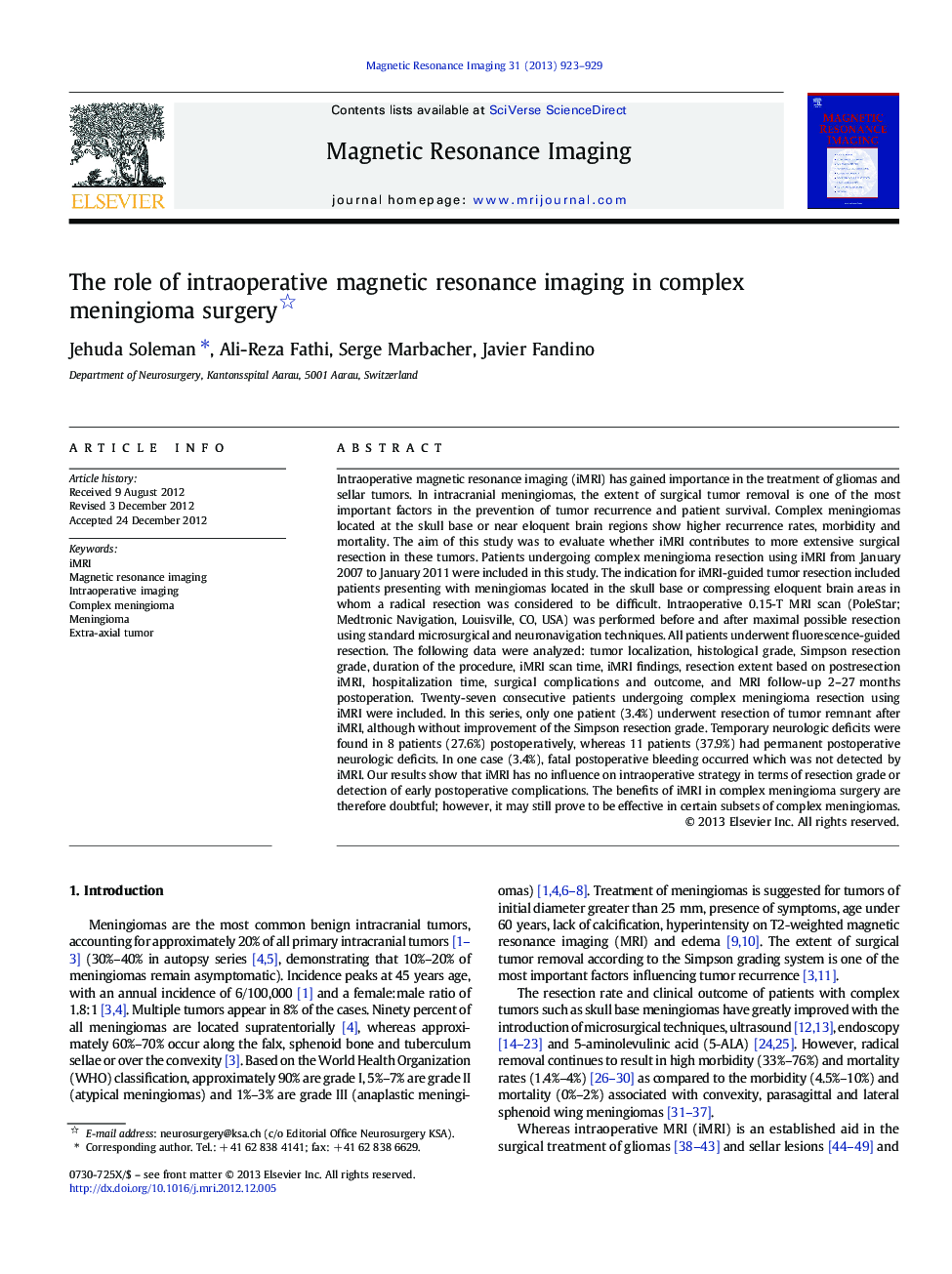| کد مقاله | کد نشریه | سال انتشار | مقاله انگلیسی | نسخه تمام متن |
|---|---|---|---|---|
| 10712678 | 1025222 | 2013 | 7 صفحه PDF | دانلود رایگان |
عنوان انگلیسی مقاله ISI
The role of intraoperative magnetic resonance imaging in complex meningioma surgery
ترجمه فارسی عنوان
نقش تصویربرداری رزونانس مغناطیسی درون عمل در جراحی پیچیده مننژیومی
دانلود مقاله + سفارش ترجمه
دانلود مقاله ISI انگلیسی
رایگان برای ایرانیان
کلمات کلیدی
موضوعات مرتبط
مهندسی و علوم پایه
فیزیک و نجوم
فیزیک ماده چگال
چکیده انگلیسی
Intraoperative magnetic resonance imaging (iMRI) has gained importance in the treatment of gliomas and sellar tumors. In intracranial meningiomas, the extent of surgical tumor removal is one of the most important factors in the prevention of tumor recurrence and patient survival. Complex meningiomas located at the skull base or near eloquent brain regions show higher recurrence rates, morbidity and mortality. The aim of this study was to evaluate whether iMRI contributes to more extensive surgical resection in these tumors. Patients undergoing complex meningioma resection using iMRI from January 2007 to January 2011 were included in this study. The indication for iMRI-guided tumor resection included patients presenting with meningiomas located in the skull base or compressing eloquent brain areas in whom a radical resection was considered to be difficult. Intraoperative 0.15-T MRI scan (PoleStar; Medtronic Navigation, Louisville, CO, USA) was performed before and after maximal possible resection using standard microsurgical and neuronavigation techniques. All patients underwent fluorescence-guided resection. The following data were analyzed: tumor localization, histological grade, Simpson resection grade, duration of the procedure, iMRI scan time, iMRI findings, resection extent based on postresection iMRI, hospitalization time, surgical complications and outcome, and MRI follow-up 2-27Â months postoperation. Twenty-seven consecutive patients undergoing complex meningioma resection using iMRI were included. In this series, only one patient (3.4%) underwent resection of tumor remnant after iMRI, although without improvement of the Simpson resection grade. Temporary neurologic deficits were found in 8 patients (27.6%) postoperatively, whereas 11 patients (37.9%) had permanent postoperative neurologic deficits. In one case (3.4%), fatal postoperative bleeding occurred which was not detected by iMRI. Our results show that iMRI has no influence on intraoperative strategy in terms of resection grade or detection of early postoperative complications. The benefits of iMRI in complex meningioma surgery are therefore doubtful; however, it may still prove to be effective in certain subsets of complex meningiomas.
ناشر
Database: Elsevier - ScienceDirect (ساینس دایرکت)
Journal: Magnetic Resonance Imaging - Volume 31, Issue 6, July 2013, Pages 923-929
Journal: Magnetic Resonance Imaging - Volume 31, Issue 6, July 2013, Pages 923-929
نویسندگان
Jehuda Soleman, Ali-Reza Fathi, Serge Marbacher, Javier Fandino,
